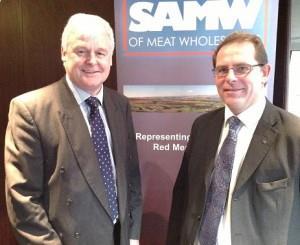Scotland’s meat wholesalers are aiming to improve end product prices and upgrade the way in which regulatory burdens are applied to the industry by government.
Alan McNaughton, president of the Scottish Association of Meat Wholesalers (SAMW), commented: “The past 12 months have been tough on prices and challenging in relation to new regulations, a combination which has added to business pressures for member companies.

“Thankfully, product quality from Scotland remains strong, in the main, underpinning the Scotch premium, without which the pressures would have been even more severe in 2015. The healthy, largely assured and beef-bred production of meat from Scottish farms remains central to our industry’s hallmark for quality and must be guarded and protected by us all.”
Alan stresses it is crucial that close attention continues to be paid to quality issues and market demands in 2016, factors which came to the surface twice during 2015 by way of a farming/processing debate over livestock spec’ requirements and discussions surrounding livestock movements.
“Senior SAMW representatives took part in some recent farmers’ meetings to ‘freshen’ the spec’ message although, in truth, spec’ demands haven’t changed that much over the years. Since those meetings, we have seen some improvements but are still frustrated when cattle which could so easily have been better prepared, still arrive to be processed as they are, non-spec’ factors included,” he added. “We do, however, recognise that our members have a part to play in encouraging Scottish producers in this respect. It is inevitable that price penalties will be more targeted if out-of-spec’ cattle continue to be presented at abattoirs. Ultimately, it’s an ‘effort and income’ issue and while some producers are successfully hitting both targets, there are some who aren’t.”
Alan says that SAMW has no problem whatsoever with plants, people and processes being properly structured and managed but the CoC issue was very badly handled.
He explained: “As a result, the CoC process grew arms and legs as the year progressed, driven on by some excessively poor advice from training bodies in the south of England, which were clearly not moderated by government. All we’re getting as a result is increased cost, not increased competence.
“As we move into 2016, therefore, it’s very much with the hope that prices will deliver a fair return for all along the supply chain; spec’ delivery will become consistently better and that those who are responsible for implementing UK and EU legislation will take time to look at how good our industry already is, and how it operates, rather than seeking the next ‘gravy train’ to keep themselves in work.”
This story was originally published on a previous version of the Meat Management website and so there may be some missing images and formatting issues.












